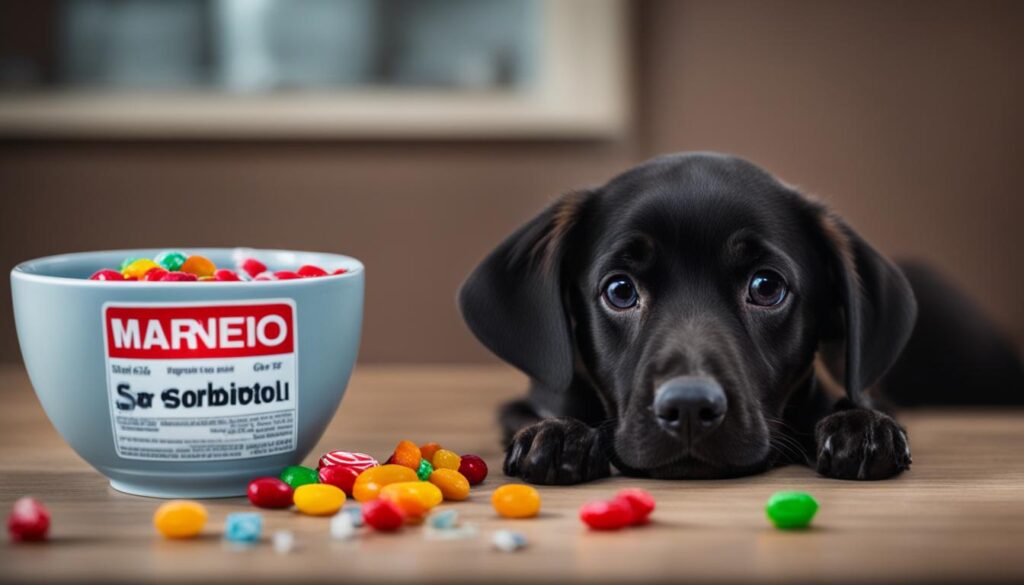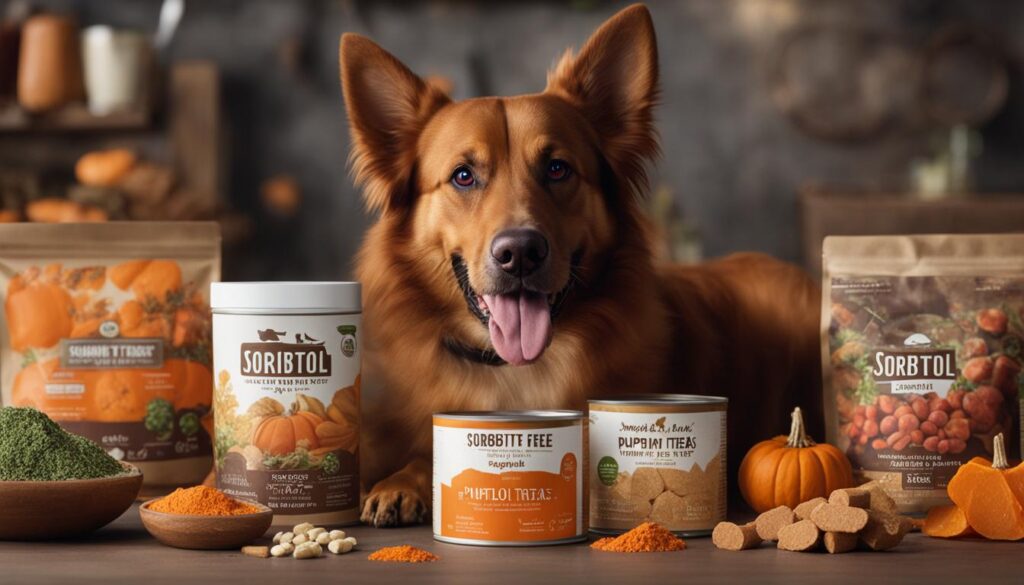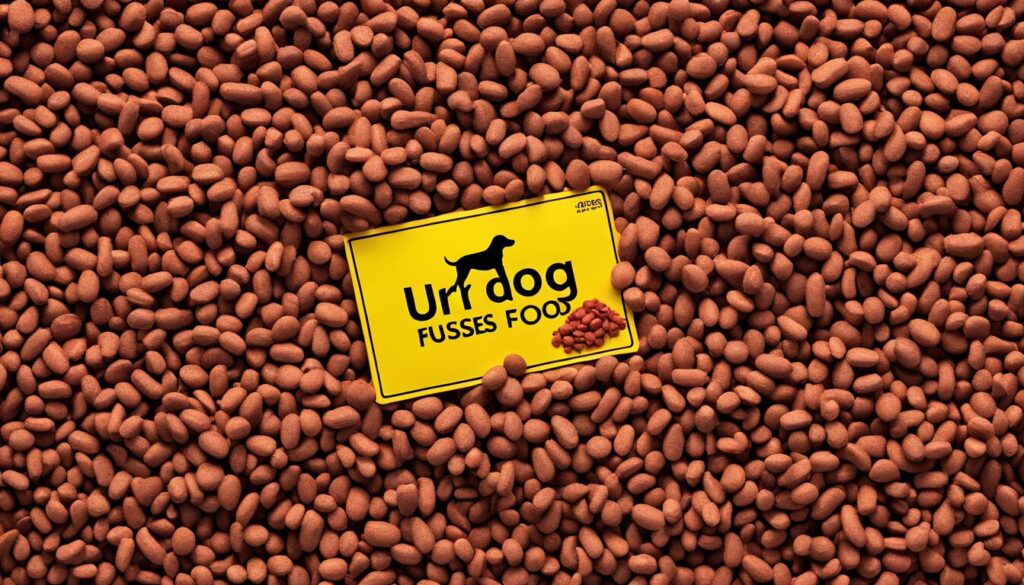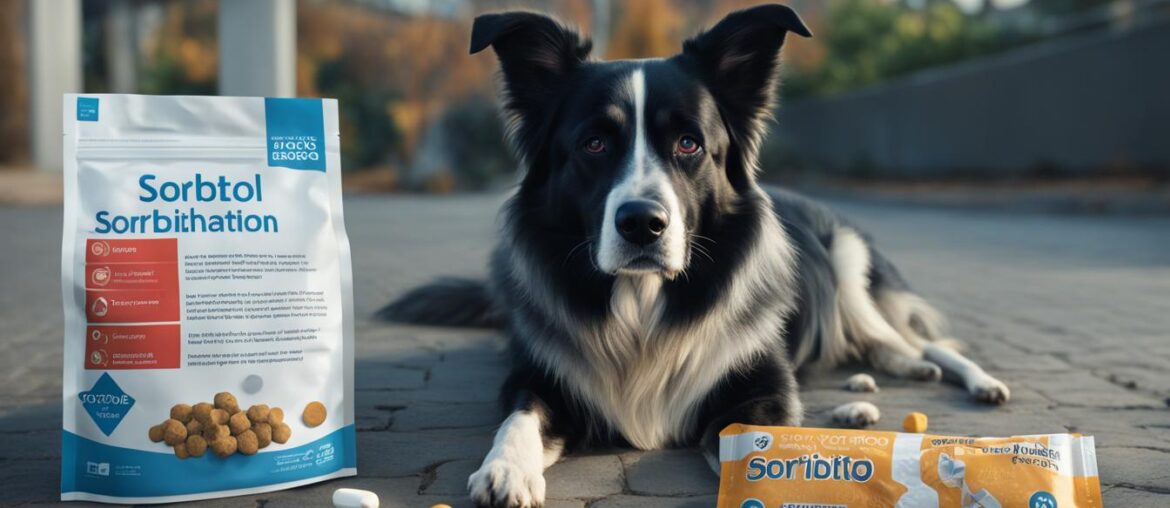Sorbitol is a common sugar substitute found in many human products, including some dog treats and medications. However, there are concerns about the safety of sorbitol for dogs. According to veterinarians, sorbitol can cause gastrointestinal upset in dogs when consumed in large amounts. In some cases, it may even lead to diarrhea and dehydration. While small amounts of sorbitol are unlikely to be harmful to dogs, it is best to consult with a veterinarian before giving your dog any products containing sorbitol.
Key Takeaways:
- Large amounts of sorbitol can cause gastrointestinal upset in dogs and may lead to diarrhea and dehydration.
- Consulting with a veterinarian is crucial before giving dogs any products containing sorbitol.
- Small amounts of sorbitol are unlikely to be harmful to dogs.
- There are plenty of sorbitol-free alternatives available for dog treats and medications.
- It is important to be cautious with other household products that can pose risks to dogs.
Understanding the Risks of Sorbitol for Dogs

Sorbitol is a sugar alcohol that can have a laxative effect on dogs. When ingested in large amounts, it can lead to sorbitol poisoning, which can cause symptoms such as vomiting, diarrhea, bloating, and even liver damage. Additionally, sorbitol can contribute to an increased risk of obesity and diabetes in dogs. It is important to be cautious when giving your dog any products that contain sorbitol and to monitor them closely for any adverse effects.
When sorbitol is consumed in large quantities, it can be highly dangerous for dogs, leading to poisoning and various side effects. The laxative effect of sorbitol can result in vomiting, diarrhea, and bloating, causing discomfort and distress for your furry companion. Furthermore, excessive ingestion of sorbitol can even result in liver damage, potentially impacting the overall health and well-being of your dog.
Aside from the immediate side effects, the long-term effects of sorbitol on dogs should not be overlooked. Due to its high sugar content, sorbitol can contribute to an increased risk of obesity and diabetes in dogs. These health conditions can lead to a myriad of other complications and significantly impact your dog’s quality of life.
As a responsible pet owner, it is crucial to be cautious when it comes to giving your dog any products that contain sorbitol. Always read the labels carefully and ensure that the sorbitol content is within safe limits. Additionally, consult with your veterinarian before introducing any new treat or medication that contains sorbitol to ensure it is suitable for your dog’s individual needs and health condition.
Signs of Sorbitol Poisoning in Dogs
Sorbitol poisoning in dogs can manifest through various symptoms, indicating potential toxicity. If you suspect your dog has ingested too much sorbitol, watch out for the following signs:
- Vomiting
- Diarrhea
- Bloating
- Abdominal discomfort
- Loss of appetite
- Lethargy
- Increased thirst and urination
- Yellowing of the skin and eyes (jaundice)
If your dog exhibits any of these symptoms or if you suspect sorbitol poisoning, it is crucial to seek immediate veterinary attention. The veterinarian will be able to provide the necessary treatment and support to help your dog recover.
Remember, knowledge and awareness are key to keeping your furry friend safe and healthy. By understanding the risks associated with sorbitol and taking appropriate precautions, you can ensure your dog’s well-being and prevent potential harm.
Alternatives to Sorbitol for Dogs

If you are concerned about the safety of sorbitol for your dog, there are plenty of sorbitol-free alternatives available. Instead of risking potential gastrointestinal upset and other health issues, you can choose dog treats and medications that do not contain sorbitol or other sugar substitutes. Opting for products made with natural ingredients and specifically formulated for dogs can provide a safer and healthier option for your furry friend.
When searching for sorbitol-free dog products, it’s essential to consult with a veterinarian. They can help you find suitable alternatives that meet your dog’s specific needs. Whether it’s dog treats or medications, your veterinarian can recommend products that prioritize your dog’s health and wellness.
Benefits of Sorbitol-Free Dog Products:
- Reduced risk of gastrointestinal upset and diarrhea
- Improved overall digestion and nutrient absorption
- Increased safety and reduced health risks
- Promotion of natural, healthy ingredients in your dog’s diet
Consulting with a veterinarian is crucial in ensuring you make the right choices for your dog’s health. They can provide valuable insights, recommend trusted brands, and help you navigate the world of sorbitol-free dog products.
| Product Name | Description |
|---|---|
| Brand A | Made with all-natural ingredients and specifically formulated for dogs. This brand offers a wide range of sorbitol-free treats and medications. |
| Brand B | A trusted brand recommended by veterinarians, providing sorbitol-free alternatives for dogs of all sizes and age groups. |
| Brand C | Specializes in sorbitol-free dog treats, ensuring your furry friend can enjoy delicious snacks without any potential health risks. |
By choosing sorbitol-free dog products and seeking guidance from a veterinary professional, you can prioritize your dog’s well-being and avoid potential health issues associated with sorbitol consumption.
The Importance of Veterinary Consultation

When it comes to the safety of your furry friend, it is essential to consult with a veterinarian before giving them any products that contain sorbitol. Every dog is unique, and what may be safe for one dog could be harmful to another. A veterinarian is the best person to assess your dog’s individual health needs and provide expert guidance on the safety of sorbitol and other ingredients.
By consulting with a veterinarian, you can gain valuable insights into how sorbitol may affect your dog’s health. They can help you understand if your dog has any pre-existing conditions or sensitivities that could make sorbitol harmful to them. Additionally, a veterinarian can provide you with alternative treatments or products that are better suited to your dog’s specific needs.
Veterinarians have the expertise to navigate the potential risks and advantages of sorbitol for your dog’s overall health. They can weigh the benefits of sorbitol against any potential harm it may cause and help you make informed decisions as a responsible pet owner.
Remember, proper veterinary consultation is crucial to ensure the well-being of your furry companion. They will consider your dog’s health history and specific circumstances before recommending the best course of action.
Consulting with a veterinarian is the key to ensuring your dog’s safety and making choices that contribute to their long-term health and happiness.
Key Takeaways:
- Consulting with a veterinarian is essential before giving your dog products that contain sorbitol.
- Every dog is different, and a veterinarian can assess your dog’s individual health needs.
- Veterinarians can provide guidance on the safety of sorbitol and recommend alternative treatments or products.
- Considering your dog’s specific needs is vital to make informed decisions as a responsible pet owner.
- Consulting with a veterinarian contributes to your dog’s overall health and well-being.
| Pros | Cons |
|---|---|
| Informed assessment of your dog’s health needs | Potential cost of veterinary consultation |
| Expert guidance on the safety of sorbitol | Possible alternative treatment or product recommendations |
| Understanding of potential risks and advantages | Dependence on veterinary expertise |
| Ability to make informed decisions as a responsible pet owner | Time and effort required to consult with a veterinarian |
The Potential Hazards of Urinary Dog Food

Urinary dog food is commonly recommended for dogs with urinary tract issues, particularly those with bladder stones. These specialized diets are formulated to dissolve and prevent the formation of struvite stones in dogs. However, it is important to be aware of the potential hazards associated with urinary dog food, including ingredients like sorbitol that may pose risks to your dog’s health.
While urinary dog food serves a specific purpose in managing urinary tract issues, it may contain additives such as sorbitol, which can cause gastrointestinal upset and other digestive problems in dogs. Sorbitol is a sugar substitute that can have a laxative effect and contribute to diarrhea and bloating in sensitive dogs.
It is crucial to carefully consider the potential benefits and risks before incorporating urinary dog food into your dog’s diet. Consulting with a veterinarian is essential to ensure that your dog’s urinary health is properly managed while minimizing any potential adverse effects caused by ingredients like sorbitol.
It is worth noting that not all urinary dog food products contain sorbitol, and your veterinarian can help you select a suitable option that is tailored to your dog’s specific needs. They may recommend a natural, sorbitol-free urinary dog food that addresses urinary tract issues without the risk of gastrointestinal upset associated with certain ingredients.
While urinary dog food can be an effective tool in managing urinary tract issues, it is important to be aware of the potential hazards and consult with a veterinarian for guidance. Your veterinarian will be able to provide comprehensive advice on feeding urinary dog food and recommend appropriate alternatives if necessary.
Risks of Urinary Dog Food
“Urinary dog food is often recommended for dogs with bladder stones, but owners should be aware of the ingredients, such as sorbitol, that may pose risks to their dogs’ health.” – Dr. Lisa Johnson, DVM
Is Sorbitol Safe for Urinary Health?
While sorbitol is commonly found in some urinary dog food products, its safety for urinary health is a topic of debate. While small amounts of sorbitol are unlikely to be harmful, excessive consumption can lead to gastrointestinal issues and contribute to digestive upset in dogs. It is recommended to consult with a veterinarian to determine the best approach to managing your dog’s urinary health while minimizing any potential risks associated with sorbitol.
Recommended Diets for Dogs with Urinary Issues

When it comes to choosing a diet for dogs with urinary issues, it is important to consult with a veterinarian to determine the best options for your pet. Certain diets are specifically formulated to support urinary health while providing the necessary nutrition for your dog’s overall well-being.
Best Wet Urinary Dog Food
For dogs with urinary issues, wet dog food can be a great option as it provides additional hydration. One recommended wet dog food for urinary health is the Purina Pro Plan Veterinary Diets UR Urinary Ox/St Canine Formula (Canned). This formula is scientifically designed to promote a healthy urinary tract and contains controlled levels of magnesium to support optimal urinary pH balance. It is also highly palatable, ensuring your dog enjoys every meal.
Best Dry Urinary Dog Food
Dry dog food is another excellent choice for dogs with urinary issues. The Hill’s Prescription Diet c/d Multicare Urinary Dry Dog Food is a top recommendation. This diet is formulated to support urinary health by controlling mineral levels and pH balance in the urine. It also contains antioxidants to promote a strong immune system and essential nutrients for your dog’s overall health.
Best Urinary Dog Food for Weight Management
Weight management is crucial for dogs with urinary issues, as excess weight can put additional strain on the urinary tract. The Hill’s Prescription Diet Dog c/d Multicare + Metabolic Urinary + Weight Care Dry Dog Food is specially formulated for dogs with urinary health concerns and weight management needs. This diet helps to dissolve struvite stones while supporting a healthy weight by promoting fat burning and preserving lean muscle mass.
Consulting with a veterinarian is essential to determine the most suitable urinary dog food for your pet’s specific needs. They can provide personalized recommendations based on your dog’s age, breed, overall health, and the severity of their urinary issues. With the right diet, you can help support your dog’s urinary health and improve their overall quality of life.
Special Considerations for Small Breed and Senior Dogs

Smaller breed dogs and senior dogs have unique nutritional needs, and it is crucial to select the right urinary dog food for their specific requirements. When it comes to providing optimal nutrition for small breed dogs with urinary issues, Royal Canin Urinary SO Small Dog Dry Dog Food is highly recommended. This specially formulated diet takes into account the specific needs and challenges of smaller breeds while addressing urinary health.
For senior dogs, Royal Canin Urinary SO Aging Dry Dog Food is designed to support their aging bodies and promote urinary health. This diet is formulated with the nutritional needs of senior dogs in mind, providing the right balance of nutrients to support their overall well-being.
By choosing these specialized urinary dog foods, you can ensure that your small breed or senior dog receives the proper nutrition and support they need to maintain urinary health.
| Brand | Type | Features |
|---|---|---|
| Royal Canin | Urinary SO Small Dog Dry Dog Food |
|
| Royal Canin | Urinary SO Aging Dry Dog Food |
|
Potential Dangers of Other Household Products for Dogs
Aside from sorbitol, there are other household products that can pose risks to dogs. It’s important to be aware of these potential dangers to ensure the safety and well-being of your furry friend. Let’s take a closer look at three specific hazards that pet owners should be cautious about: paintballs, ice melts, and cyanobacterial blooms.
Paintball Toxicosis in Dogs
Paintballs may seem harmless, but they contain compounds that can be harmful to dogs. Some of these compounds include sorbitol, glycerol, and polyethylene glycol. When ingested in significant quantities, these substances can cause severe acid/base and electrolyte abnormalities in dogs, leading to serious health issues.
Ingestion of paintballs can result in symptoms such as vomiting, diarrhea, dehydration, and even kidney damage. If you suspect that your dog has ingested paintballs or is displaying any unusual symptoms, it’s essential to seek veterinary care immediately.
Ice Melts and Pet Safety
During the winter months, many pet owners use ice melts to keep their driveways and walkways safe. However, it’s crucial to choose ice melts that are pet-safe and avoid those that contain harmful ingredients such as sodium chloride, potassium chloride, and magnesium chloride.
These chemicals can irritate your dog’s paws and skin when they come into contact with them. Ingesting ice melts can also lead to gastrointestinal upset, electrolyte imbalances, and other health problems in dogs.
To ensure your pet’s safety, opt for pet-friendly ice melts that are specifically labeled as safe for use around animals. Additionally, after walks outside, wipe your dog’s paws with a damp cloth to remove any residue from ice melts and prevent them from ingesting harmful substances during grooming.
Cyanobacterial Blooms and Pet Exposure
Cyanobacterial blooms, also known as blue-green algae, can appear in bodies of water such as ponds, lakes, and even backyard pools. These blooms can produce toxins that are harmful to pets if they are ingested or come into contact with contaminated water.
Exposure to cyanobacterial blooms can result in symptoms such as vomiting, diarrhea, difficulty breathing, weakness, seizures, and even death in severe cases. It is essential to prevent your pet from drinking or swimming in water that may be affected by these blooms.
If you notice any signs of cyanobacterial blooms in water sources near your home, keep your pet away from them and contact local authorities for assistance in addressing the issue.
| Hazard | Compounds Involved | Symptoms |
|---|---|---|
| Paintball Toxicosis | Sorbitol, Glycerol, Polyethylene Glycol | Vomiting, Diarrhea, Dehydration, Kidney Damage |
| Ice Melts and Pet Safety | Sodium Chloride, Potassium Chloride, Magnesium Chloride | Foot and Skin Irritation, Gastrointestinal Upset, Electrolyte Imbalances |
| Cyanobacterial Blooms | Toxic Algal Toxins | Vomiting, Diarrhea, Difficulty Breathing, Weakness, Seizures, Death |
Myotonia and Phenoxy Herbicides in Dogs
Myotonia, a muscle disorder, can occur in dogs exposed to high levels of phenoxy herbicides, such as 2,4-D and MCPA. Dogs affected by myotonia may exhibit symptoms such as weakness, ataxia, and tremors. It is important for dog owners to exercise caution when using phenoxy herbicides around their pets to minimize the risk of myotonia development. If any signs of myotonia are observed in a dog, it is crucial to seek immediate veterinary care for diagnosis and appropriate treatment.
Exposure to phenoxy herbicides can be detrimental to a dog’s health, and understanding the potential risks is essential for responsible pet ownership. By taking proactive measures to avoid exposing dogs to these herbicides and promptly seeking veterinary assistance if myotonia symptoms arise, we can help safeguard the well-being of our beloved canine companions.
For further insight into myotonia in dogs and the link between phenoxy herbicides and dog health, refer to the table below:
| Myotonia in Dogs | Phenoxy Herbicides and Dog Health |
|---|---|
| Myotonia is a muscle disorder characterized by delayed relaxation of muscles after voluntary contraction. | Phenoxy herbicides, such as 2,4-D and MCPA, have been associated with myotonia development in dogs. |
| Signs of myotonia in dogs include muscle stiffness, weakness, abnormal gait, and tremors. | Exposure to phenoxy herbicides can cause symptoms of myotonia in dogs, including weakness, ataxia, and tremors. |
| Myotonia can be diagnosed through physical examination, electromyography (EMG), and genetic testing. | Excessive exposure to phenoxy herbicides can lead to myotonia, and veterinary consultation is crucial for accurate diagnosis and treatment. |
| Management of myotonia in dogs may involve supportive care, medication, and lifestyle modifications. | To protect dogs from myotonia, it is important to exercise caution when using phenoxy herbicides and seek veterinary care if myotonia symptoms are observed. |
Additional Resources:
- AVMA – Plants, Herbs, and Pest Control Products
- AKC – American Kennel Club
- ASPCA – American Society for the Prevention of Cruelty to Animals
Ionophores and Pets
Ionophores, such as monensin and lasalocid, are commonly used as feed additives in livestock. While pets, particularly those roaming in areas where livestock are housed, can be exposed to these products, they can have harmful effects on dogs. Ionophores can target skeletal muscle tissue in dogs, causing weakness, depression, and even respiratory paralysis. It is essential to keep pets away from areas where ionophores are used and seek veterinary care if exposure occurs.
Paraquat Poisoning in Pets
Paraquat, an herbicide commonly used in agriculture, can be poisonous to pets. Ingestion of paraquat can lead to severe symptoms such as abdominal tenderness, vomiting, diarrhea, and respiratory compromise. Treatment for paraquat poisoning is often unsuccessful, and prevention is key. Keeping pets away from areas where paraquat has been applied and seeking immediate veterinary care for suspected ingestion are crucial steps in protecting pets from paraquat poisoning.
| Symptoms | Treatment | Prevention |
|---|---|---|
| Abdominal tenderness | Immediate veterinary care | Avoidance of paraquat-treated areas |
| Vomiting | Supportive care | Proper labeling and storage of paraquat |
| Diarrhea | Respiratory support if needed | Secure fences to prevent access to treated areas |
| Respiratory compromise |
Paraquat poisoning can be a life-threatening condition for pets. Immediate veterinary attention is crucial to increase the chances of survival. Veterinarians may provide supportive care, such as IV fluids and medications, to manage symptoms and increase the likelihood of a successful outcome. However, it’s important to note that the prognosis for paraquat poisoning in pets is often poor.
Wrapping Up
In conclusion, when it comes to sorbitol and other potentially harmful ingredients in dog products, it is crucial to prioritize the safety and well-being of our pets. While small amounts of sorbitol may not be harmful to dogs, it is always best to consult with a veterinarian before introducing any sorbitol-containing products into your dog’s diet. Veterinarians recommend being cautious and aware of other household products that can pose risks to dogs as well. Taking necessary precautions and seeking guidance from a veterinarian can help us make informed choices that promote the health and longevity of our furry friends.
Remember, our dogs rely on us to keep them safe and healthy. By staying informed about potential dangers, consulting with professionals, and choosing products specifically formulated for dogs, we can provide the best care for our beloved pets. Let’s prioritize their well-being and make conscious decisions that prioritize their overall health and happiness.
Your dog’s health is in your hands. Stay informed, consult with your veterinarian, and make responsible choices. Together, we can ensure that our four-legged companions live long, happy, and healthy lives.
FAQ
Is sorbitol safe for dogs?
Sorbitol can cause gastrointestinal upset in dogs when consumed in large amounts. It is best to consult with a veterinarian before giving your dog any products containing sorbitol.
What are the risks of sorbitol for dogs?
Sorbitol can cause symptoms such as vomiting, diarrhea, bloating, and even liver damage when ingested in large amounts. It can also increase the risk of obesity and diabetes in dogs.
Are there alternatives to sorbitol for dogs?
Yes, there are plenty of sorbitol-free dog treats and medications available. Look for products made with natural ingredients and specifically formulated for dogs.
Should I consult with a veterinarian before giving my dog sorbitol-containing products?
Yes, it is important to consult with a veterinarian to assess your dog’s individual health needs and get guidance on the safety of sorbitol and other ingredients.
What are the potential hazards of urinary dog food?
Urinary dog food may contain ingredients like sorbitol that can cause gastrointestinal upset and other health problems in dogs. It is important to weigh the potential benefits against the risks.
What are some recommended diets for dogs with urinary issues?
Purina Pro Plan Veterinary Diets UR Urinary Ox/St Canine Formula (Canned), Hill’s Prescription Diet c/d Multicare Urinary Dry Dog Food, and Hill’s Prescription Diet Dog c/d Multicare + Metabolic Urinary + Weight Care Dry Dog Food are some recommended options for urinary health.
Are there special considerations for small breed and senior dogs?
Yes, there are specific urinary dog food options available for small breed and senior dogs, such as Royal Canin Urinary SO Small Dog Dry Dog Food and Royal Canin Urinary SO Aging Dry Dog Food. These diets address the unique needs of smaller breeds and older dogs.
What are some potential dangers of other household products for dogs?
Paintballs, ice melts, and cyanobacterial blooms (blue-green algae) can pose risks to dogs if ingested or exposed. They can cause various health problems and should be avoided.
What is myotonia and how are phenoxy herbicides related to it in dogs?
Myotonia is a muscle disorder that can be associated with exposure to phenoxy herbicides like 2,4-D and MCPA. Dogs exposed to these herbicides may display symptoms such as weakness, ataxia, and tremors.
What are ionophores and how do they affect pets?
Ionophores are feed additives used in livestock that can be harmful to dogs. They can target skeletal muscle tissue and cause weakness, depression, and respiratory paralysis in dogs.
Can paraquat be poisonous to pets?
Yes, paraquat, an herbicide used in agriculture, can be poisonous to pets. Ingestion of paraquat can lead to severe symptoms such as abdominal tenderness, vomiting, diarrhea, and respiratory compromise.
What is the conclusion about sorbitol and other hazards for dogs?
Consult with a veterinarian, consider sorbitol-free options, and be aware of other household products that can be hazardous to dogs to keep them safe and healthy.






